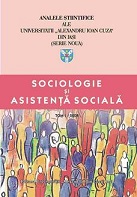DEFINITION OF GUSTISM – THE APPLICABILITY OF THE GENERATION-BASED BIOGRAPHICAL RESEARCH ON THE BUCHAREST SCHOOL OF SOCIOLOGY –
DEFINITION OF GUSTISM – THE APPLICABILITY OF THE GENERATION-BASED BIOGRAPHICAL RESEARCH ON THE BUCHAREST SCHOOL OF SOCIOLOGY –
Author(s): Balázs TelegdySubject(s): Social Sciences
Published by: Editura Universităţii »Alexandru Ioan Cuza« din Iaşi
Keywords: Dimitrie Gusti; Bucharest School of Sociology; biographical research; generation theory
Summary/Abstract: In the current paper I am going to apply different approaches of the “generation” aspect, in order to determine the belonging of the members of the Bucharest School of Sociology from the biographical analysis perspective. I am particularly interested in the question whether, through the definition of generation, is possible that a group of people, very different in many aspects, could create a homogeneous generation, only because they were adepts of the monographic method and followers of the Professor Dimitie Gusti. To answer the question, I am going to present the main theoretical approaches in the conceptualization of the notion of generation, after which I will apply these definitions to the different categories affiliated with the Bucharest School of Sociology. From this point of view, I will consider the followers of D. Gusti as belonging to a single generation, a generation existent by the above mentioned theoretical points of view. As for this particular generation, it could be affirmed that they formed, in the Manheimian perspective, a generation unit in 1920-1930, and afterwards, beside the existence of a “core” led by the Professor, some representatives of the initial group went on coexisting as a part of the same effective generation, but in different generation units.
- Issue Year: 6/2013
- Issue No: 2
- Page Range: 122-129
- Page Count: 8
- Language: English

